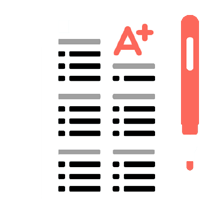International English Language Testing System (IELTS)
- Home
- Language Tests
- IELTS
Overview
IELTS
The International English Language Testing System (IELTS) is designed to help you work, study or migrate to a country where English is the native language. This includes countries such as Australia, Canada, New Zealand, the UK and USA.
Your ability to listen, read, write and speak in English will be assessed during the test.
IELTS is graded on a scale of 1-9.

Types of tests

IELTS Academic
The IELTS Academic test is suitable for those wanting to study in an English-speaking environment or university (higher education). You can also take IELTS Academic for professional registration purposes. The test measures if you are ready to begin studying in English. It features vocabulary that is familiar within an academic setting. You can choose whether to take IELTS Academic on paper, on computer or online at home or other suitable location.

IELTS General
The IELTS General Training test is suitable for those applying to study below degree level. This includes an English-speaking school or college. It can also be taken for work experience or other employment training. IELTS General Training is also required for migration to Australia, Canada, New Zealand and the UK. The test features everyday English language skills that you will need in social and workplace environments. IELTS General Training is available to take on paper and on computer only.
Which countries require IELTS






Test Format
The Listening, Reading and Writing tests are completed on the same day, with no breaks in between them.
The Speaking test, however, may be scheduled up to a week before or after the other tests.
| Format | Segments | Overview | Duration |
|---|---|---|---|
| Listening | Recording 1 – a conversation between two people set in an everyday social context. Recording 2 – a monologue set in an everyday social context, e.g. a speech about local facilities. Recording 3 – a conversation between up to four people set in an educational or training context, e.g. a university tutor and a student discussing an assignment. Recording 4 – a monologue on an academic subject, e.g. a university lecture. | Assessors will be looking for evidence of your ability to understand the main ideas and detailed factual information, the opinions and attitudes of speakers, the purpose of an utterance and evidence of your ability to follow the development of ideas. | 30 Minutes |
| Academic Reading | Paper format: Three reading passages with a variety of questions using a number of task types. No. of questions: 40 | The Reading section consists of 40 questions, designed to test a wide range of reading skills. These include reading for gist, reading for main ideas, reading for detail, skimming, understanding logical argument and recognising writers' opinions, attitudes and purpose. | 60 minutes |
| General Reading | Paper format: There are three sections. Section 1 may contain two or three short texts or several shorter texts. Section 2 comprises two texts. Section 3, there is one long text. No. of questions: 40 | The Reading section consists of 40 questions, designed to test a wide range of reading skills. These include reading for gist, reading for main ideas, reading for detail, skimming, understanding logical argument and recognising writers' opinions, attitudes and purpose. | 60 minutes |
| Academic Writing | Task 1 - you will be presented with a graph, table, chart or diagram and asked to describe, summarise or explain the information in your own words. You may be asked to describe and explain data, describe the stages of a process, how something works or describe an object or event. Task 2 - you will be asked to write an essay in response to a point of view, argument or problem. Responses to both tasks must be in a formal style. | Covers topics that are of general interest to, and suitable for, test takers entering undergraduate and postgraduate studies or seeking professional registration. | 60 minutes |
| General Writing | Task 1 - you will be presented with a situation and asked to write a letter requesting information, or explaining the situation. The letter may be personal, semi-formal or formal in style. Task 2 - you will be asked to write an essay in response to a point of view, argument or problem. The essay can be fairly personal in style. | Topics are of general interest, that help gather understanding of language ability. | 60 minutes |
| Speaking | Part 1 - the examiner will ask you general questions about yourself and a range of familiar topics, such as home, family, work, studies and interests. This part lasts between four and five minutes. Part 2 - you will be given a card which asks you to talk about a particular topic. You will have one minute to prepare before speaking for up to two minutes. The examiner will then ask one or two questions on the same topic. Part 3 - you will be asked further questions about the topic in Part 2. These will give you the opportunity to discuss more abstract ideas and issues. This part of the test lasts between four and five minutes. | The speaking section assesses your use of spoken English. Tests are recorded. | 11–14 minutes |
Band Scores
IELTS results are reported on a scale from 1 (the lowest) to 9 (the highest).
All formats of IELTS use the same scoring system.
| Bands | Skill level | Description |
|---|---|---|
| 9 | Expert user | The test taker has fully operational command of the language. Their use of English is appropriate, accurate and fluent, and shows complete understanding. |
| 8 | Very good user | The test taker has fully operational command of the language with only occasional unsystematic inaccuracies and inappropriate usage. They may misunderstand some things in unfamiliar situations. They handle complex and detailed argumentation well. |
| 7 | Good user | The test taker has operational command of the language, though with occasional inaccuracies, inappropriate usage and misunderstandings in some situations. They generally handle complex language well and understand detailed reasoning. |
| 6 | Competent user | The test taker has an effective command of the language despite some inaccuracies, inappropriate usage and misunderstandings. They can use and understand fairly complex language, particularly in familiar situations. |
| 5 | Modest user | The test taker has a partial command of the language and copes with overall meaning in most situations, although they are likely to make many mistakes. They should be able to handle basic communication in their own field. |
| 4 | Limited user | The test taker's basic competence is limited to familiar situations. They frequently show problems in understanding and expression. They are not able to use complex language. |
| 3 | Extremely limited user | The test taker conveys and understands only general meaning in very familiar situations. There are frequent breakdowns in communication. |
| 2 | Intermittent user | The test taker has great difficulty understanding spoken and written English |
| 1 | Non-user | The test taker has no ability to use the language except a few isolated words. |
| 0 | Did not attempt the test | The test taker did not answer the questions. |
People Also Ask
You will receive an email and SMS at your registered email ID and mobile number confirming your venue details and schedule of your IELTS, 2-3 days prior to the exam date.
Details of the test (venue, date, and time) are sent to the candidates 2-3 days prior to the test date on the registered email address and mobile number.
Testing body endeavours to offer speaking slot chosen by the candidate, however given the circumstances, there may be a possibility that chosen slot is not available.
Only pens, pencils and erasers. You must bring the passport/national identity card you used on the IELTS Application Form to the test. A transparent water bottle is allowed without labels. You must leave everything else outside the examination room. Mobile phones and pagers must be switched off and placed with personal belongings in the area designated by the supervisor.
IELTS uses a 9-band scoring system to report test scores in a consistent manner. You receive individual band scores for Listening, Reading, Writing and Speaking and an Overall Band Score on a band scale from one to nine.
Pen and paper-based IELTS (PB IELTS):
Results will be available online on the 13th day after the test date.
Computer-delivered IELTS (CD IELTS):
Results will be available online within 3-5 days after the test date.
UK Visas and Immigration (UKVI):
Results will be available online on the 13th day after the test date.
Canada, UKVI and Life Skills:
Results will be available online on the 7th day after the test date.
An IELTS Test Report Form (TRF) is valid for two (2) years.
A candidate can re-sit or take the IELTS test at any time.

Give Us A Call
+971 4 373 9500
Send Us A Message
info@theacelearning.com
Office Location
1508/1509, Westburry Tower Office, Business Bay, Dubai
Copyright (c) 2021-2023 ACE LEARNiNG
A product of
ACE LUXURY IMMIGRATION SOLUTIONS LLC


